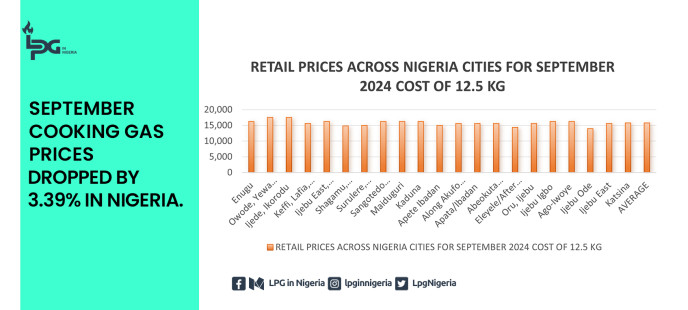- 4538
- 0
Sharing Ideas and Updates on LPG in Nigeria and related information to enable effective collaboration within the LPG Value Chain
September Cooking Gas Prices Dropped By 3.39% In Nigeria.

The following report highlights the retail prices of cooking gas (LPG) across various cities and states in Nigeria for September 2024. It provides insights into the cost of 12.5 kg cylinders and the price per kilogram (KG). We gathered these prices from different areas of the country via social media (Facebook, Linkedin and X). In September 2024, the price of a 12.5 kg cooking gas cylinder varied significantly across different regions in Nigeria. The average cost was ₦15,784.52 for 12.5 kg, with the corresponding cost per kg averaging around ₦1,263.08.
We would also like to thank Mr Leo-Adegun Favour, MSc attache to NMDPRA field office Ibadan from the University of Ibadan.
Detailed Price Breakdown by City/State:
1. Enugu
Cost of 12.5 kg: ₦16,250
Cost per kg: ₦1,300
Enugu's price was slightly above the national average for September and represents a moderate pricing structure compared to other regions.
2. Owode, Yewa Ogun State
Cost of 12.5 kg: ₦17,500
Cost per kg: ₦1,400
Owode saw the highest price for cooking gas in September, reflecting potential supply chain or regional demand issues.
3. Ijede, Ikorodu
Cost of 12.5 kg: ₦17,500
Cost per kg: ₦1,400
Similar to Owode, Ikorodu also had the highest pricing, indicating that Lagos State, particularly its suburban areas, might face elevated LPG costs.
4. Keffi, Lafia, Taraba State
Cost of 12.5 kg: ₦15,625
Cost per kg: ₦1,250
Keffi offered LPG slightly below the average, making it relatively affordable in comparison to other cities.
5. Ijebu East, Ogun State
Cost of 12.5 kg: ₦16,250
Cost per kg: ₦1,300
Ijebu East's price was consistent with the average, suggesting a stable market in this part of Ogun State.
6. Shagamu, Ogun State
Cost of 12.5 kg: ₦14,850
Cost per kg: ₦1,188
Shagamu had one of the lowest prices, indicating greater affordability in the region.
7. Surulere, Lagos State
Cost of 12.5 kg: ₦15,000
Cost per kg: ₦1,200
Surulere’s pricing was slightly below average, presenting reasonable costs for a Lagos urban area.
8. Sangotedo, Lekki, Lagos State
Cost of 12.5 kg: ₦16,250
Cost per kg: ₦1,300
Sangotedo, part of Lekki, saw prices consistent with the national average, likely due to its high standard of living.
9. Maiduguri
Cost of 12.5 kg: ₦16,250
Cost per kg: ₦1,300
Prices in Maiduguri were in line with the average, indicating reasonable accessibility in the region.
10. Kaduna
Cost of 12.5 kg: ₦16,250
Cost per kg: ₦1,300
Kaduna followed the average pricing, maintaining stable gas prices across the region.
11. Apete, Ibadan
Cost of 12.5 kg: ₦15,000
Cost per kg: ₦1,200
Apete’s price was moderately below average, providing a lower cost of living for households in Ibadan.
12. Along Akufo Road/Ibadan
Cost of 12.5 kg: ₦15,625
Cost per kg: ₦1,250
Prices in this area reflected stability and affordability for residents.
13. Apata/Ibadan
Cost of 12.5 kg: ₦15,625
Cost per kg: ₦1,250
Apata shared a similar price with other Ibadan areas, indicating overall consistency in Ibadan’s gas market.
14. Abeokuta Road/Ibadan
Cost of 12.5 kg: ₦15,625
Cost per kg: ₦1,250
This location maintained consistent pricing with other Ibadan neighbourhoods.
15. Eleyele/After Emadeb Energy/Ibadan
Cost of 12.5 kg: ₦14,375
Cost per kg: ₦1,150
Eleyele had the lowest price in Ibadan, offering a more affordable option for residents.
16. Oru, Ijebu
Cost of 12.5 kg: ₦15,625
Cost per kg: ₦1,250
Oru’s pricing was stable, aligning with the national average.
17. Ijebu Igbo
Cost of 12.5 kg: ₦16,250
Cost per kg: ₦1,300
Prices here were on par with the national average, indicating balanced affordability.
18. Ago-Iwoye
Cost of 12.5 kg: ₦16,250
Cost per kg: ₦1,300
Similar to Ijebu Igbo, Ago-Iwoye’s pricing was average.
19. Ijebu Ode
Cost of 12.5 kg: ₦14,000
Cost per kg: ₦1,120
Ijebu Ode had the lowest price across Nigeria, providing a more affordable option in the LPG market.
20. Ijebu East
Cost of 12.5 kg: ₦15,625
Cost per kg: ₦1,250
Prices here aligned with the national average, indicating a stable gas market.
21. Katsina
Cost of 12.5 kg: ₦15,750
Cost per kg: ₦1,260
Katsina’s price was close to the average, indicating balanced costs in the region.
Regional Price Differences
South-West (Lagos, Ogun, Ibadan)
This region displayed a broad price range. The highest price (₦17,500 in Ijede and Owode) was found here, but it also featured some of the lowest prices, such as ₦14,000 in Ijebu Ode. The average in this region hovered around ₦15,625 to ₦16,250, aligning closely with the national average, but the regional variation was significant.
North-East (Maiduguri, Taraba)
Maiduguri had a stable price of ₦16,250, consistent with the national average, while Taraba was slightly lower at ₦15,625. Prices here suggest reasonable affordability compared to more expensive cities like Ikorodu.
North-West (Kaduna, Katsina)
Kaduna and Katsina showed relatively stable prices at ₦16,250 and ₦15,750, respectively. These regions reflected a steady market, with prices close to the national average.
South-East (Enugu)
Enugu stood at ₦16,250, maintaining an average pricing structure for LPG, and providing an affordable option compared to higher-cost regions in the South-West.
Key Observations:
Highest Prices: Owode and Ijede, Ikorodu both recorded the highest cost at ₦17,500 for 12.5 kg (₦1,400 per kg).
Lowest Prices: Ijebu Ode had the lowest price at ₦14,000 for 12.5 kg (₦1,120 per kg).
The average price of LPG across Nigeria decreased by approximately 3.39% from August to September 2024. This drop in prices may be attributed to market stabilization, better distribution channels, or a potential government intervention in the energy sector. However, the regional disparities highlight that some areas, especially in the South-West, are still seeing higher prices, which could limit accessibility for some households.
















0 Comment.